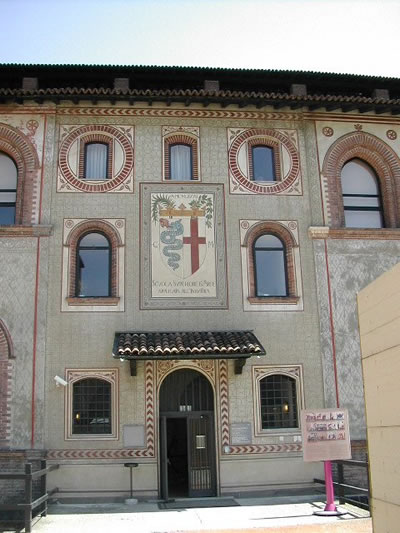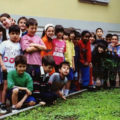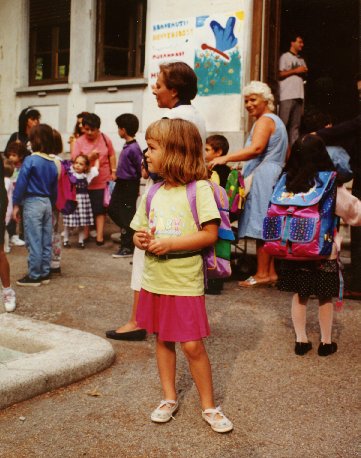One of the areas inside the castle that Leonardo da Vinci designed for the Duke of Milan houses a school for applied arts, appropriately enough.
Tag Archives: Italian education
Education in Italy: One Foreign Parent’s Views & Experiences
Caveat: The articles in this section are based on my family’s experience of the Italian education system in a specific time and place: Milan, and later Lecco, from 1991 to 2007. I haven’t lived in Italy all my life, nor ever attended any Italian educational institution myself, so my views may be biased, and your mileage may vary based on your location, specific school, and specific child.
- daycare
- preschool
- elementary
- middle school
- high school
- schoolbooks
- brighter sides
- in loco parentis
- integration
- news (2004):Â Compulsory School Age, Bought Diplomas
- school trips
- sex education
- socialization
- teaching evolution
- teaching religion
- teaching English
Homeschooling in Italy
Yes, it is possible. I don’t know much about it, though I investigated briefly a few years ago.
Adult Continuing Education
One option for distance learning: the Open University (I did my MBA with them).
Ross Got Into Woodstock School
A week or so ago I ran across this on the blog of one of my new colleagues at Sun:
To A Daughter Leaving Home
When I taught you
at eight to ride
a bicycle, loping along
beside you
as you wobbled away
on two round wheels,
my own mouth rounding
in surprise when you pulled
ahead down the curved
path of the park,
I kept waiting
for the thud
of your crash as I
sprinted to catch up,
while you grew
smaller, more breakable
with distance,
pumping, pumping
for your life, screaming
with laughter,
the hair flapping
behind you like a
handkerchief waving
goodbye.
…in other words: Ross will be attending Woodstock School in India next year.
I’m so happy I’m in shock. And, at the same time… I will miss her to the marrow of my bones. Wish us all luck.
A School Year Abroad
In my encounters with fellow alumni of Woodstock School, many naturally ask me if and when my own daughter will attend. The answer is: with a great deal of luck, she will start in August, 2007, for an exchange year which will be her fourth/senior year at Woodstock, but only her penultimate year of Italian high school.
The application process has not been easy. Not surprisingly, the application forms and process for SAGE (Studies Abroad in Global Education, the US-based outfit that runs Woodstock’s exchange program) are slanted towards US students. There are differences between Italian and US school systems and cultures that could cause an Italian applicant to look “weak”.
American private schools and universities are fond of “well-rounded” applicants, expecting students to be doing sports, public service, paid work, arts, etc., in addition to lots of schoolwork (apparently, no one is allowed time to just be a kid anymore).
Almost none of this is likely or even possible for Italian kids.
Italian Students Are Not “Well-Rounded” – Here’s Why
There are no extra-curricular activities in Italian public schools (I assume for lack of funding). The only sport is PE. There is no music, no school newspaper or yearbook, rarely drama, no clubs. There is student government (mandated by law), but only two class representatives (plus two for the whole school) are elected per year, and they don’t do much. There are occasional special events that students can volunteer to participate in (Ross is usually the photographer). Ross’ current private school does try to get their kids to do volunteer work, in a very limited way (Ross tutors a younger girl in English).
Some kids do after-school sports or dance, a few competing very seriously, but participation at that level is expensive and takes a lot of time. Otherwise, Italian kids don’t have opportunities for awards or recognition. Volunteerism exists in Italy only on a small scale, and few kids are encouraged to participate. Almost none but the truly needy work after school or during summers – it was unusual that Ross did an internship last summer, at the company where I worked.
Italian kids simply don’t have time or opportunity to do much of anything outside of school and homework. One effect of this is that kids who are not good at academics may never get a chance to shine at anything, nor to realize that they may have non-academic skills that are useful and valued in society. This can’t be good for their self-esteem. No wonder so many seem to be drifting and unmotivated.
The SAGE application asks about a “guidance counselor,” a role which doesn’t exist in the Italian system. No guidance is offered about university entrance or careers – kids figure these things out together with their parents, which may be part of the reason that many university students seem profoundly uninterested in the degrees for which they are studying.
Some high schools used to have part-time psychological counsellors available, but those positions have disappeared from public schools with recent cuts in education funding.
There is no tracking in Italian schools, no honors levels or anything of that sort: everyone does exactly the same classes as their classmates, sink or swim. If you fail three or more subjects in a year, you repeat the year, and the failure rates are astonishing. In Ross’ first year of high school, six or seven of the 25 kids in her class failed. The same thing happened again in her second year (which was when Ross herself failed). I’m not crazy about the American practice of “social promotion,” either, but there’s got to be a happy medium somewhere!
Italian grading is a mystery to me. In high school, students are graded on a scale of 1-10, with 6 being a pass, but grades above 7 don’t seem to be assigned at all routinely. Given that, and the high rate at which students fail classes and entire grade levels, I was amazed to learn last year that 97% of students pass the maturità (school leaving exam) on their first try, with some high proportion getting very good marks. Perhaps the teachers grade harshly throughout high school to keep them humble. In discussion about this on the Expats in Italy forum, one Italian participant opined that some high school teachers grade punitively to enhance their own sense of power. (Hey, she said it, not me!)
The SAGE application further asks: “Smoking, use of alcoholic beverages and drug abuse are unacceptable at SAGE schools. Does the applicant have a history of using any of these?”
My answer: “In Italy, it was until a few months ago perfectly legal for 16-year-olds to buy and consume alcohol. A new law says 18 [I’m not even sure this passed], but it’s doubtful that this will survive as law, let alone be applied in real life. Most Italian kids drink wine at home with their families from age 12 or even younger – this is a cultural norm. Smoking is legal from age 16, and many kids (unfortunately) smoke. Light drugs such as marijuana are treated lightly by the law. (Ross drinks, but she knows the rules, and will abide by them at Woodstock.)”
Anticipating a Difficult Re-Entry
A huge question mark over this whole exchange idea is what happens when the student returns. The Italian government encourages students to go on exchange programs during both high school and university, and increasing numbers are doing so, usually to English-speaking countries so that they can become fluent in English. But their re-entry into the Italian system is difficult.
The classes they take as high school seniors in average American public schools are far behind the levels at which their Italian peers study in the fourth year. Unless they had excellent grades when they left (which is difficult – see above), upon return to Italy most face the unappetizing prospect of studying (alone) all summer to make up the deficit, then trying to pass comprehensive exams before the new school year starts in fall, so that they can rejoin their peers in the fifth year. If they choose not to do this, or fail too many of the tests, they must repeat the fourth year.
Some of this process would be easier if we had signed Ross up to one of the several established exchange programs in Italy, but these give you no control over where you end up and for Ross, who doesn’t need to learn English, going to some random school in the US is not particularly appetizing. For the sake of future Italian students who may wish to attend Woodstock (which likes to be as international as possible), I may eventually talk to some of these agencies and see what the prospects are for working together, but they would not move in time to help Ross for next year (one I wrote to months ago never responded to my email).
So we’re doing this on our own. Because Woodstock has much higher standards than most American public schools, I am hoping that Ross will be able to avoid some re-entry hassles if we carefully match what she studies there (e.g., in math, physics, and science) with what she’ll be missing here. Some subjects, such as Dante, she will certainly have to do on her own.
Assuming that she’s even accepted to Woodstock in the first place. With Ross’ long history of being a misfit in the Italian school system, her grades are disastrous. But the prospect of going to Woodstock seems to be a powerful motivator: now, when it’s almost too late, she is throwing herself into her studies, and starting to see results. It’s not easy for her, and probably never will be, but she’s trying hard. Let’s hope it achieves the results she desires.
what Ross wrote about it
Further Addendum from D
Mar 4, 2007
In the flurry of gathering papers and filling in forms, I forgot to mention perhaps the most important result I’d like to see for Ross if she attends Woodstock: friendships. Not that she lacks for friends here, but there’s something qualitatively different about the friendships one makes in a situation like Woodstock. My classmates, staff, and other friends from Woodstock are my family: the people I can rely on to understand me deeply and be there for me, as I am for them.
And this doesn’t just apply to the people who happened to be there when I was there. With the shared bond of this very unique (okay, weird!) experience, superficial differences like nationality or religious belief simply fall away. I can meet any Woodstocker, anywhere in the world, and, no matter whether I’ve met them before or they’re twenty (or more!) years older or younger than me, I know that, at the very least, I can look forward to a good conversation.
Addendum: Rossella was accepted into Woodstock School. Now we have a lot to do.
School Cheating in Italy
School continues to be hell, not just for Rossella, but also for her parents. She scraped through her repeat second year at a new (private, Catholic) school with two academic debits (failed classes) – math and physics, as always.
Being in private school has advantages: last year she had private tutoring in math from a retired teacher with whom she got along very well, and even came close to passing a test or two towards the end of the year. Her regular math teacher was pleased with her progress, and actually in tears at losing her to another teacher this year.
This new teacher appears to be… inexperienced. While discounting for Ross’ prejudices against teachers, and especially math teachers, I do suspect there’s a real problem there. Ross’ story is that the teacher can’t keep control of the class or keep their attention; suggestions from the students on how to do so (e.g., have them do problems on the board, as their previous teacher did) were not heeded for long. So the teacher, out of some spirit of revenge, or because she thinks they should know the stuff, gives them long and complex tests which few of the class have any hope of getting through.
One group of students decided to divide up the test, each doing a part, and then swap their results. Those results were not necessarily correct, but at least they got through the whole test, which is more than most of the students toughing it out on their own were able to do.
I don’t know how they are pulling this off under the teacher’s nose – like most teachers in Italy, she seems to be blissfully unaware of (or deliberately ignoring) the massive cheating that goes on in her classroom.
This has long been a mystery to me. Every child and parent you speak to in Italy is well aware that cheating goes on. Many parents will admit to having done it themselves, and tacitly or explicitly condone their own children’s cheating. So how can the teachers not know that it’s occurring? Perhaps those who choose to become teachers were such academic swots (secchioni – big buckets – is the Italian term) in their own schooldays that they never needed or wanted to cheat, and therefore never learned the techniques, and don’t know what to look out for.
This widespread cheating is damaging in so many ways. In situations like the one with the current math teacher, Ross and others who don’t cheat will fail the test – without the cheating, according to Ross, almost all of the class would have failed that particular test. Were that to happen, the teacher and the principal would (I suppose) have to take note. I’m not a strong believer in bell curves, but if 90% of your class fails, something went wrong that you can’t just blame on the students.
However, those who cheated got higher marks than they otherwise would have, skewing the results. Were the teacher to be confronted on her unsuccessful teaching style, she could point to those kids and say: “Some of them obviously succeeded in learning from me.” They didn’t – they cheated. So the teacher can continue to believe that she’s doing a good job. And Ross, and others, will continue to struggle and fail – honestly.
Last year at this school, a girl close to graduating was discovered to have been cheating on her Greek tests for years. She was not allowed to take the maturita’ (school leaving exam), and was forced to repeat the year. But why did it take her teachers so long to catch on?
Jun 26, 2007 – The math teacher finally caught on when, on the last test of the year, 90% of the tests turned in were identical. Only Ross and one other student (out of a class of ~25) had not cheated. The teacher zeroed out the results of that test and gave another one the following week, which was to Ross’ advantage as she had not done well on the first one. But the teacher did not go back and re-evaluate what had happened on the previous tests, nor did she recalculate anyone’s final grades.
To my mind, there should have been a penalty for the cheaters. All these kids have now learned by experience that cheating is fine, as long as you can get away with it, and there are no real penalties even when you do get caught! And this in a class where the physics teacher had earlier been angry over the degree of cheating he observed on one of his tests, and warned them that if it happened again there would be consequences. But when it happened again with a different teacher, there were no consequences. Again, very poor moral lesson: if one "boss" catches you misbehaving, try it on another.
Situations like this make me just want to go and slap somebody.
Your thoughts and experiences on this?









